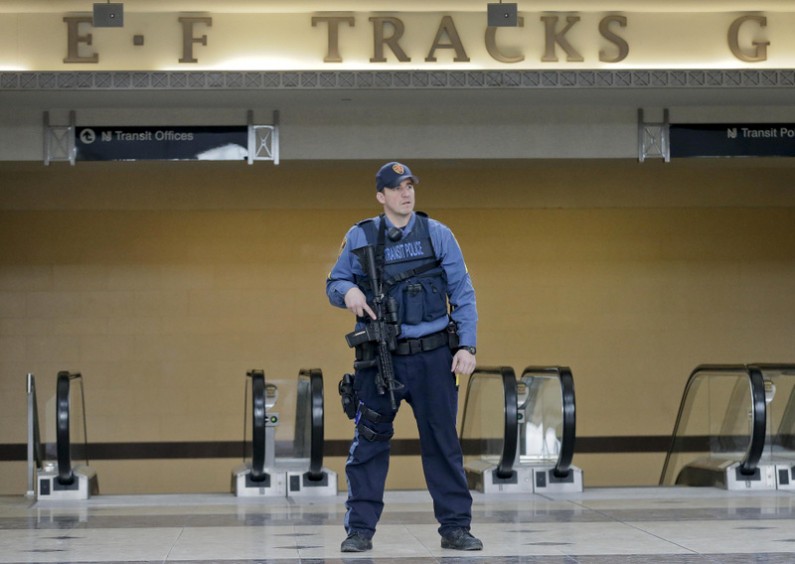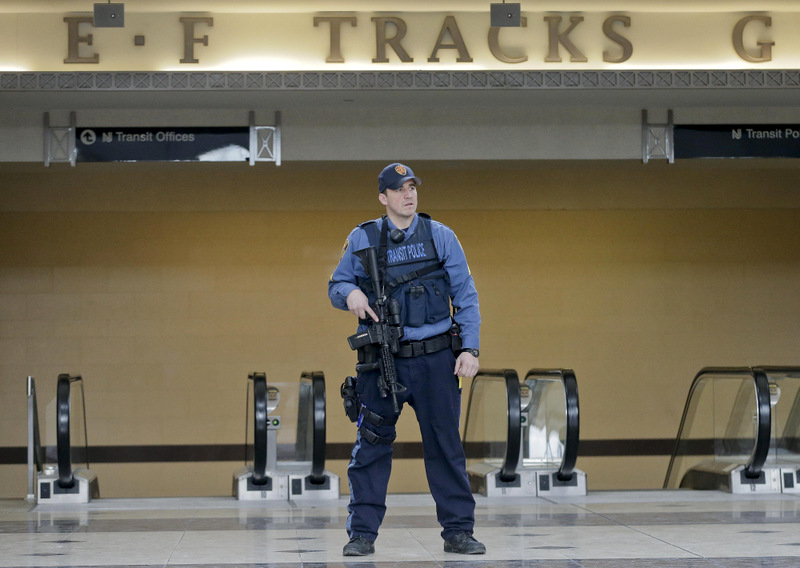
The U.S. Transportation Security Administration released a 25-page report on Wednesday, in which it recommended Congress require every U.S. airport to employ armed law enforcement officers at airport security checkpoints and ticketing counters.
The concern, however, is that there is no guarantee that an armed officer’s presence would mitigate the chances of an armed individual walking into an airport and opening fire, nor does it guarantee that the rights awarded upon the American public under the U.S. Constitution would be protected.
According to the TSA’s recommendation, the armed officers wouldn’t necessarily be at the security checkpoints and ticketing counters at all times, but during peak times only — at least for now. The report did not offer details on what it considers “peak times.”
Despite the blue police-style uniform, badges and the TSA’s insistence that they can legally grope travelers during a “pat-down,” the main reason TSA agents are asking for armed police presence is because the agency is technically not law enforcement and its agents are not allowed to be armed.
Unlike other law enforcement agents, in order to be considered for employment, TSA employees only need to have high school diploma and pass a background check as well some basic skills tests.
Though TSA agents spend their days ensuring that guns, explosives and other potentially dangerous items such as 3.1 ounces of lotion don’t make it past the security checkpoints, they can not do anything but monitor an offending individual until police arrive. They also can not detain anyone attempting to bring restricted items through security. If an agent has an issue with a traveler, they are instructed to call a local police agency, which often has a few officers patrolling nearby airports.
In addition to the presence of armed police officers alongside TSA agents, some of the 14 other recommendations include increasing training on how to deal with gunmen and improving emergency response communications in airports. But when it comes to the use of gun-toting officers, there is no explicit language in the report detailing what exactly the officer’s role would be or what kind of information they would have access to.
Although the TSA was created after Sept. 11, 2001 “to strengthen the security of the nation’s transportation systems and ensure the freedom of movement for people and commerce,” airports are actually run by local operators. As a result, almost every airport in the United States has a different security plan. While all of the plans must be approved by the TSA, the individualized plans may make it difficult — but not impossible — for Congress to mandate a specific action be taken in every U.S. airport.
Mixed reaction
Though the TSA’s ultimate recommendation was to staff armed police officers at security checkpoints and ticketing counters, TSA Administrator John S. Pistole said he personally doesn’t think having more guns at checkpoints is the solution to stopping gunmen from coming to the airport, but the union representing about 45,000 TSA officers disagreed.
Los Angeles International Airport Police Chief Patrick Gannon has historically sided with Pistole, saying he doesn’t want to force his officers to be stationed solely at checkpoints. But Gannon appeared to have had a change of heart on Wednesday, when he released a statement saying that he and other LAX law enforcement officials agree with the report’s recommendations that armed officers should be staffed alongside TSA agents.
The American public, however, seems to have a different reaction to the report’s arguably most controversial recommendation, with some expressing concerns about how much further TSA will legally be allowed to go in violating civil liberties if they have armed police officers backing them up.
Florida resident Jean de Oro told MintPress News that having armed police officers at security checkpoints would be a bad idea given that TSA, or, as he called them, “Theft Security Asses,” have the worst reputation.
While Hawaii resident James Warrior agreed that the recommendations were not a good idea, he also said the TSA program should be terminated.
Rep. Bennie Thompson (D-Miss.), part of the Homeland Security Committee, applauded the TSA’s efforts to make air travel safer, but said he has some “lingering concerns about the ability of TSA personnel to communicate with first responders during emergencies.”
Constitutional Attorney John Whitehead of the Rutherford Institute, who has represented Americans whose Fourth Amendment rights were violated by the TSA, told MintPress that he also has concerns about the recommendation, which was inspired by the shooting at LAX that resulted in the death of a TSA agent in November last year.
“It’s like a Sandy Hook situation,” Whitehead said about the LAX shooting. “Armed cops are not going to stop them,” since the shooters often target police officers first.
He went on to explain that the problem with staffing armed police officers in the airport is that these officers may get involved in situations in which people get upset about the security screening process.
Whitehead said having armed officers may work if they are adequately trained in the Fourth Amendment and remember that the people coming through security are not hardened criminals, but Americans whose constitutional rights are being violated. “The key is training,” he said.
Another concern for Whitehead is how the presence of armed police officers, who may be equipped with assault rifles, will impact travelers’ sense of safety. He said many travelers don’t like the scanners already in place, and with an armed police presence, they “may get even more feisty.”
He said he recently spoke to journalists in Germany and Sweden who expressed concerns about the level of security already in the U.S. Foreign journalists, he said, often tell him that U.S. airports are a stressful place to go and that they don’t want this kind of policing in their airports.
“They’re all becoming anti-Americans,” Whitehead said, since our airports are riddled with too many police officers and guns.
If ever there was a need for armed officers, Whitehead said it would only be at a high-security airport such as one in New York or LAX, but he stressed that they are not needed.
As Whitehead said, we’re already moving more toward becoming a police state without armed officers at the airport, but if this is something that the TSA and Congress do feel is necessary, police officers have to be trained to calmly and respectfully interact with passengers who are upset about the privacy violations they endure at the airport.
But given that police officers are being trained to be more and more aggressive and there’s been an increase in the number of SWAT-style raids, Whitehead is skeptical that officers would be able to show restraint.
Concerns about TSA
Many of the concerns about the TSA’s latest push to work with armed police officers stem from revelations made about the agency in the past. For example, in February, former TSA agent Jason Edward Harrington penned a piece for Politico in which he openly shared his dislike for a job that for five years had him “patting down the crotches of children, the elderly and even infants” and confiscating nail clippers from pilots — “the implied logic being that pilots could use the nail clippers to hijack the very planes they were flying.”
In his piece, Harrington verified that though the TSA had long denied accusations of racial profiling, he said agents had a list of countries that prompted a traveler to undergo a full-body pat-down and have their luggage thoroughly examined. However, countries like Saudi Arabia and Pakistan, where most of the 9/11 terrorists came from and where the attacks were planned, were not included on the profiling list.
Harrington also confirmed that the full-body scanners produced revealing images of travelers that many TSA agents enjoyed looking at, validating concerns that the American public and privacy groups have expressed since it appeared that the machines allowed agents to see a traveler naked.
In January 2013, the TSA got rid of the Rapiscan Systems scanners for ones that were less graphic. But since the TSA has continuously lied to the American public and violated their Fourth Amendment protections against unreasonable search and seizure, the American public’s faith in the agency appears to be dwindling. Still, to travel by plane, many continue to go along with TSA agents’ requests.
Whether the presence of armed police officers would increase the TSA’s accountability or allow the agency to further violate the public’s civil liberties is something only time can tell. But given the ever-increasing presence of an Orwellian police state in the U.S., it’s likely we already know the answer.


